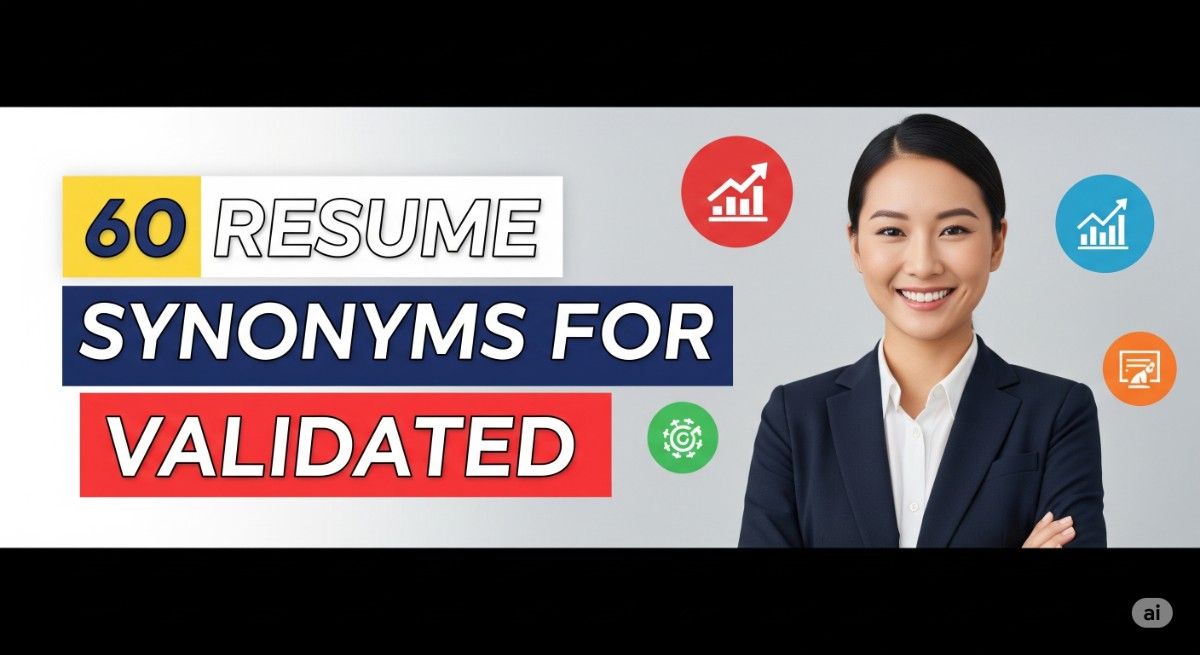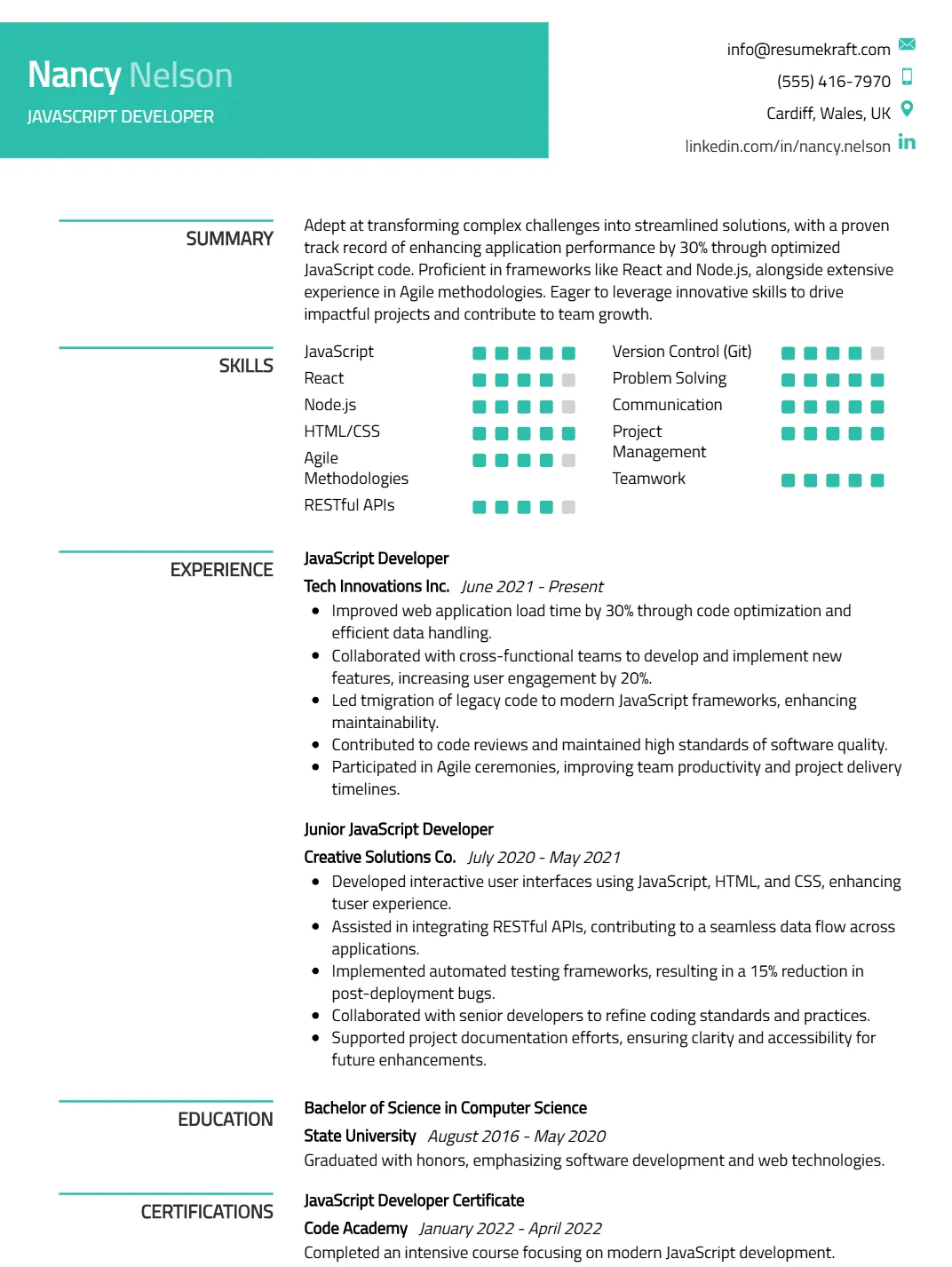
12 JavaScript Developer Resume Samples & Templates for 2025
A JavaScript Developer plays a crucial role in the tech industry by creating dynamic and interactive web applications that enhance user experience. As the backbone of modern web development, JavaScript enables developers to build responsive interfaces and functionality that engage users effectively. With the rise of web-based applications and the increasing demand for skilled programmers, the role of a JavaScript Developer has become more critical than ever in today’s job market. This article will provide insights into crafting an impactful resume tailored for this dynamic role, highlighting essential skills, experiences, and tips for standing out to potential employers.
- JavaScript Developer resume examples
- How to format a JavaScript Developer resume template
- How to write your JavaScript Developer resume experience
- How to list your hard skills and soft skills on your resume
- How to list your certifications and education on your resume
- How to write your JavaScript Developer resume summary or objective
- Additional sections for a JavaScript Developer resume
- Key takeaways for writing a professional JavaScript Developer resume
- Frequently Asked Questions
JavaScript Developer resume examples
JavaScript Developer resume examples serve as valuable tools for job seekers aiming to showcase their skills and experience effectively in a competitive job market. By examining these examples, candidates can gain insights into essential formatting, relevant skills, and impactful language that highlight their technical expertise and project accomplishments. This understanding helps them craft resumes that stand out to potential employers and align with industry expectations.
JavaScript Developer Resume

Why This Resume Works
This resume effectively highlights the candidate’s five years of experience in JavaScript development, showcasing key skills like React and Node.js that are essential for modern web applications. Its clear, structured format allows hiring managers to quickly identify relevant qualifications. The inclusion of Agile methodologies aligns with industry standards, enhancing its appeal. Additionally, the resume is optimized for ATS compatibility by using specific keywords related to the job title.
Front-End Developer Resume
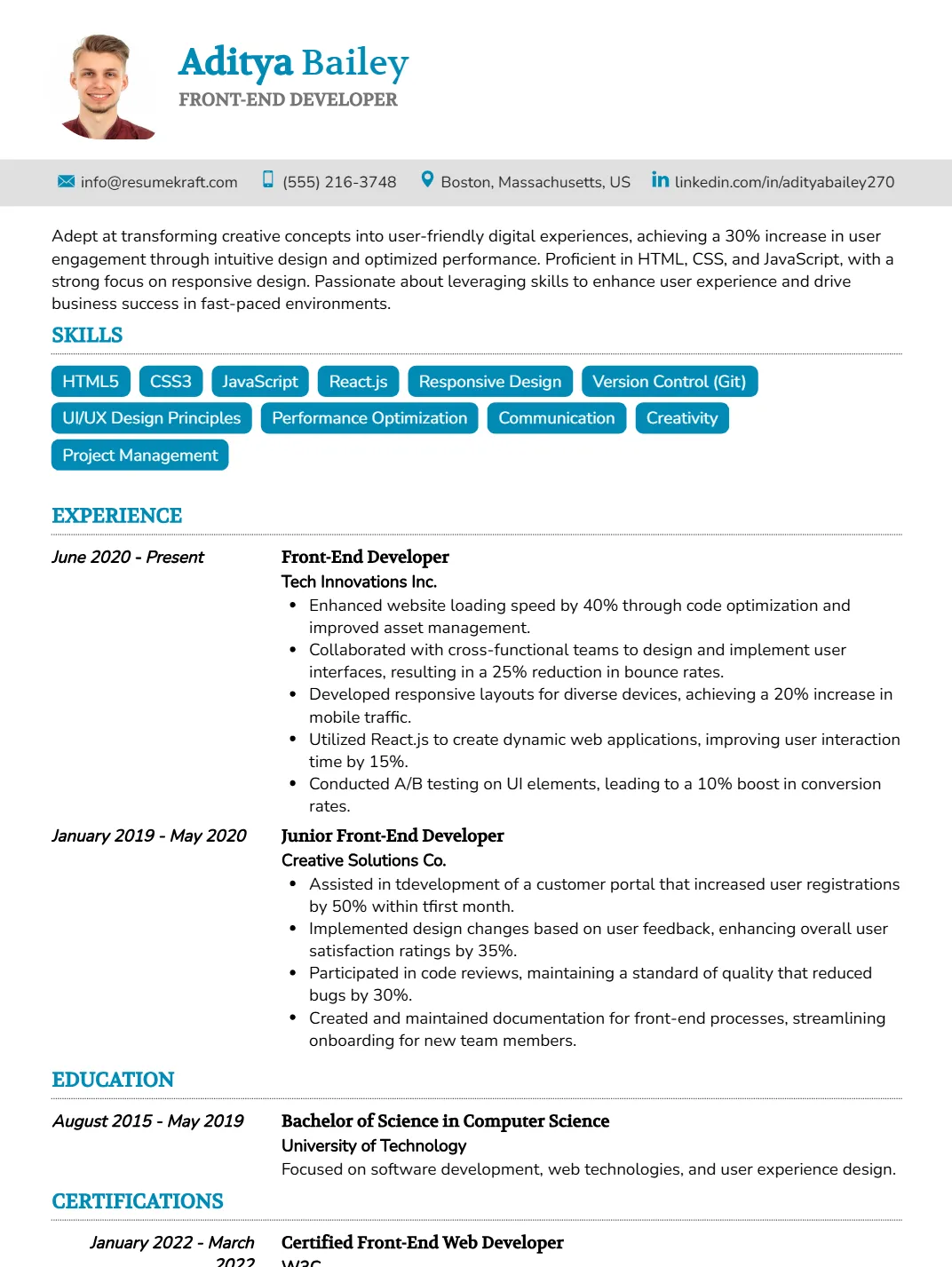
Why This Resume Works
This resume effectively highlights the candidate’s six years of relevant experience as a Front-End Developer, showcasing essential skills like HTML5, CSS3, JavaScript, and React.js. The clear structure emphasizes technical proficiencies and project achievements, making it easy for hiring managers to assess qualifications quickly. Its ATS-friendly format includes keywords pertinent to the industry, ensuring visibility in automated screenings. Additionally, the strategic presentation of accomplishments related to responsive design demonstrates the candidate’s ability to create user-centric applications, aligning perfectly with job expectations.
Back-End Developer Resume
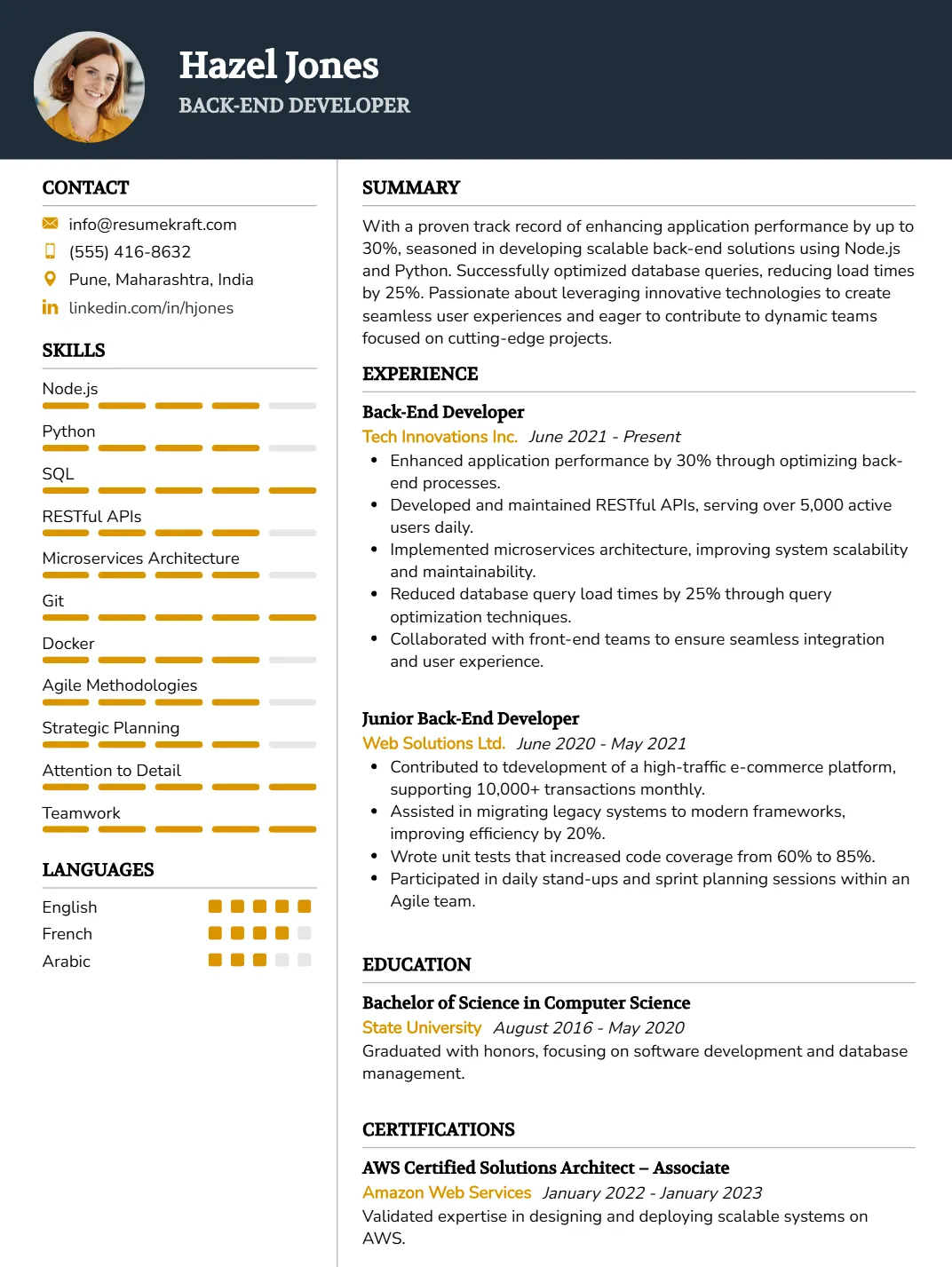
Why This Resume Works
This resume effectively showcases the candidate’s expertise as a Back-End Developer through a clear emphasis on relevant skills such as Node.js, Python, and SQL, all vital for back-end development. With five years of progressive experience, it highlights a strong foundation in RESTful APIs and Microservices Architecture. The structured format enhances readability and ATS compatibility, ensuring key terms are easily recognized. Additionally, the strategic presentation of achievements demonstrates tangible contributions to projects, making it compelling for hiring managers seeking skilled back-end talent.
Full-Stack Developer Resume
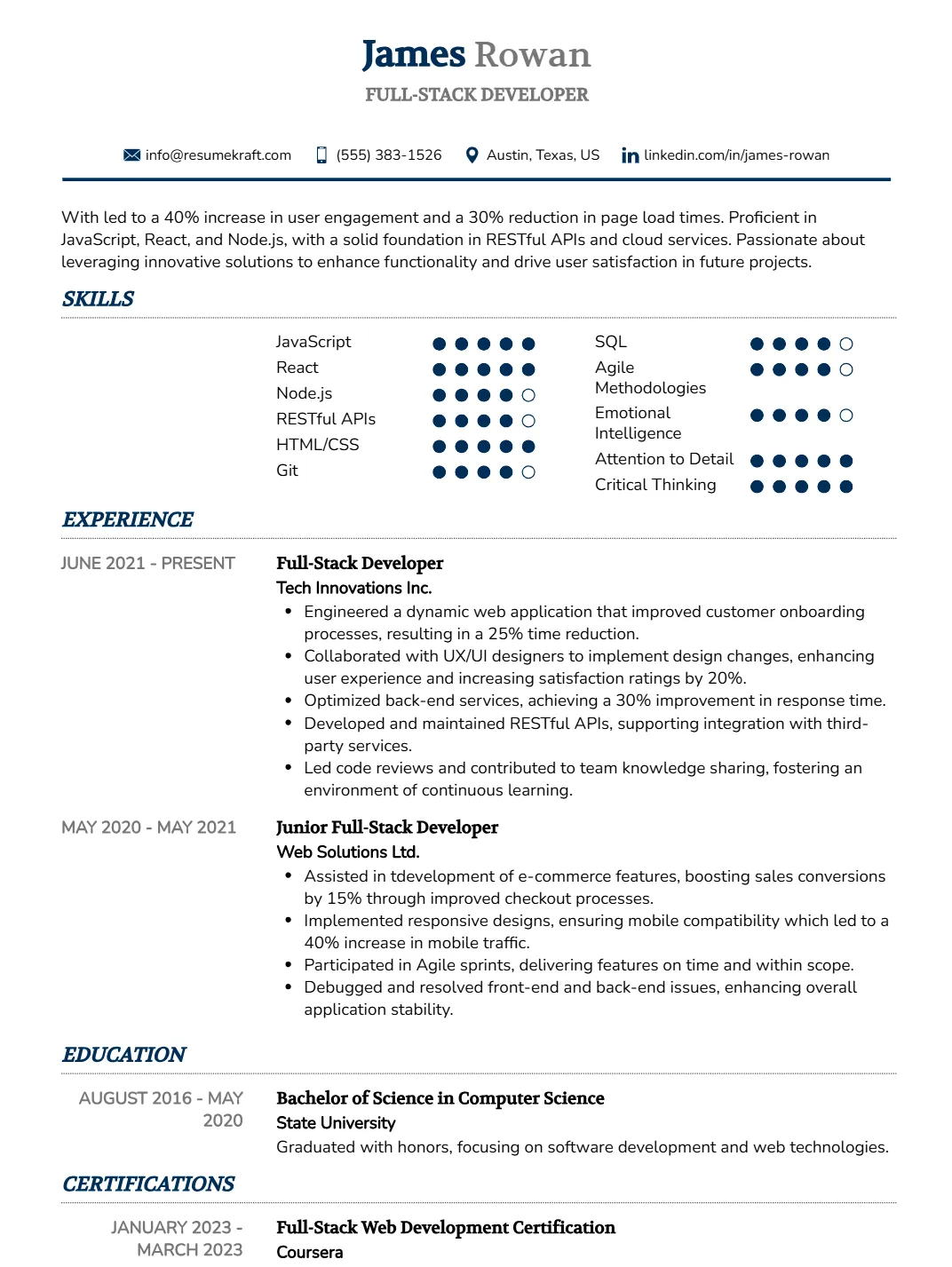
Why This Resume Works
This resume effectively showcases the candidate’s qualifications for a Full-Stack Developer position by highlighting essential skills like JavaScript, React, and Node.js, which are integral to modern web development. With about five years of relevant experience, it emphasizes a clear career progression from Junior to Full-Stack Developer. The structured format enhances readability and includes keywords for ATS compatibility, ensuring it passes automated screenings. Additionally, strategic presentation of achievements demonstrates tangible contributions to projects, making the candidate stand out in a competitive field.
React Developer Resume
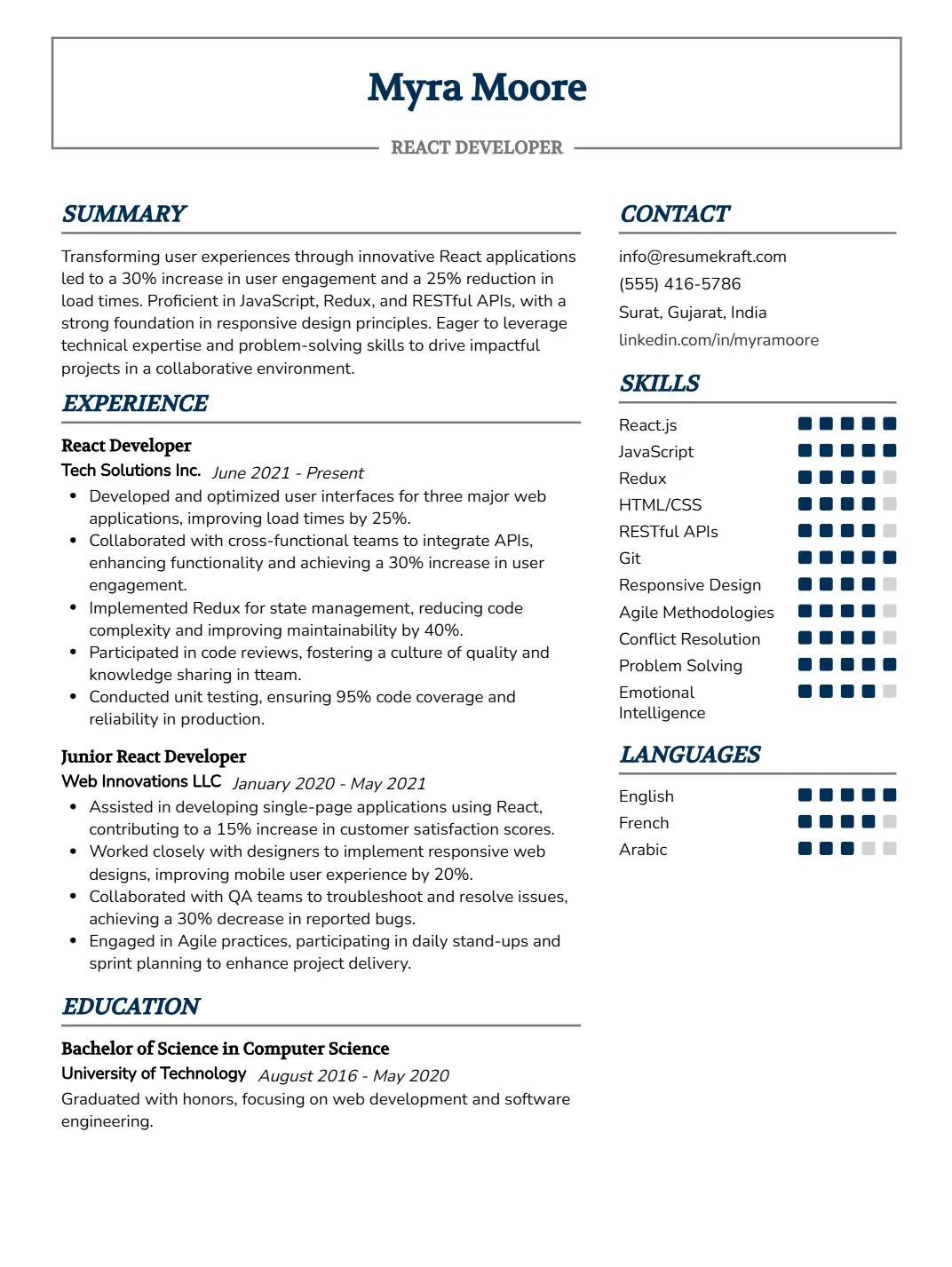
Why This Resume Works
This resume effectively showcases a candidate’s suitability for a React Developer position by prominently featuring key skills such as React.js, JavaScript, and Redux, which are essential in this field. With approximately five years of relevant experience, the structured format highlights progressive roles that demonstrate growth and expertise. The clear organization enhances ATS compatibility through keyword optimization. Additionally, strategic presentation of achievements, such as successful project completions or performance metrics related to UI/UX improvements, underscores the candidate’s impact within the industry.
Node.js Developer Resume
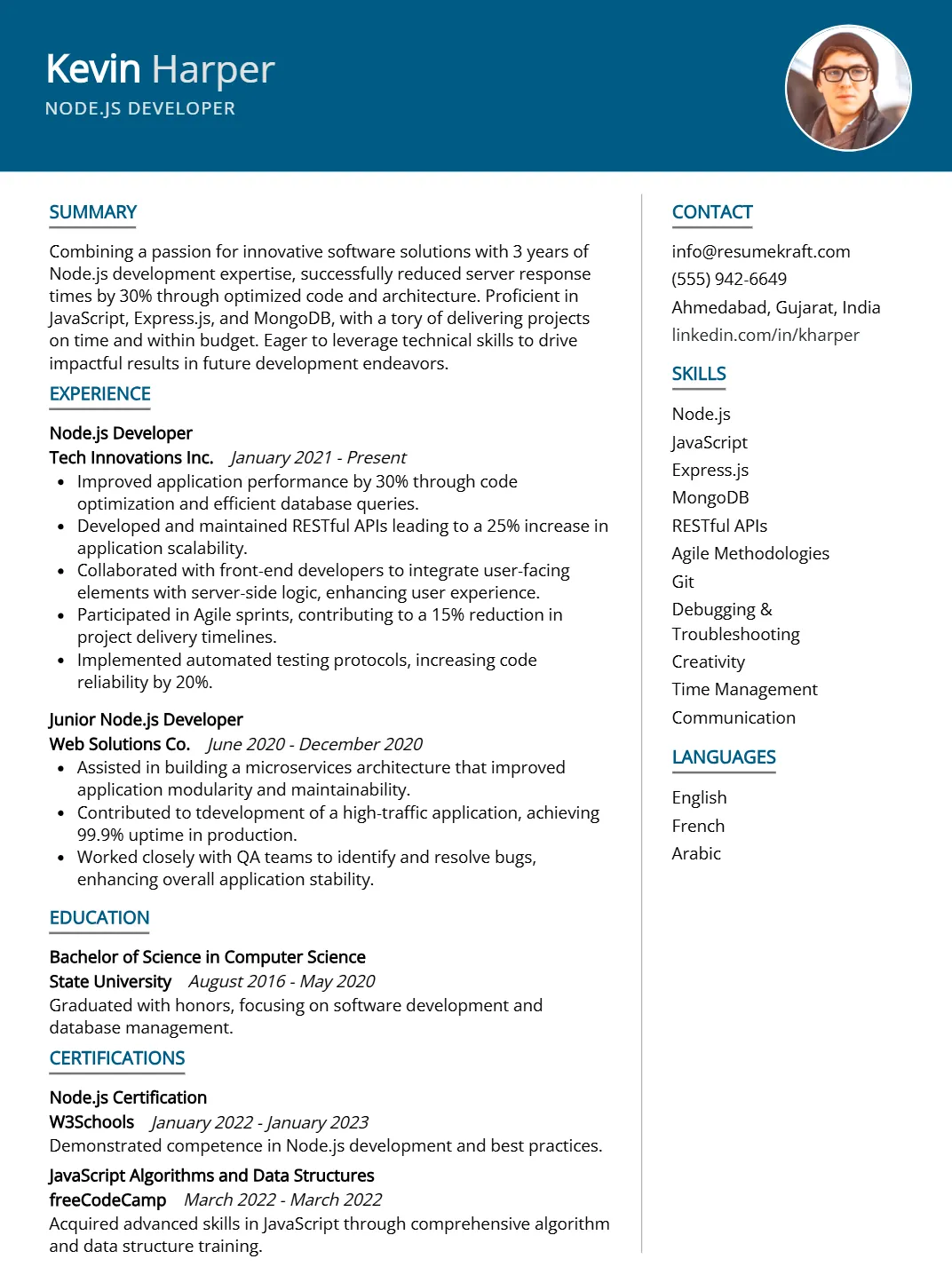
Why This Resume Works
This resume effectively highlights the candidate’s relevant skills, including Node.js, JavaScript, and RESTful APIs, directly aligning with the requirements of a Node.js Developer position. The structured format enhances readability, making it easy for hiring managers to identify key qualifications. Additionally, the use of industry-specific keywords ensures ATS compatibility, increasing chances of passing initial screenings. Strategic presentation of achievements in previous roles demonstrates practical experience and problem-solving abilities, further solidifying the candidate’s suitability for the role in a competitive job market.
Vue.js Developer Resume
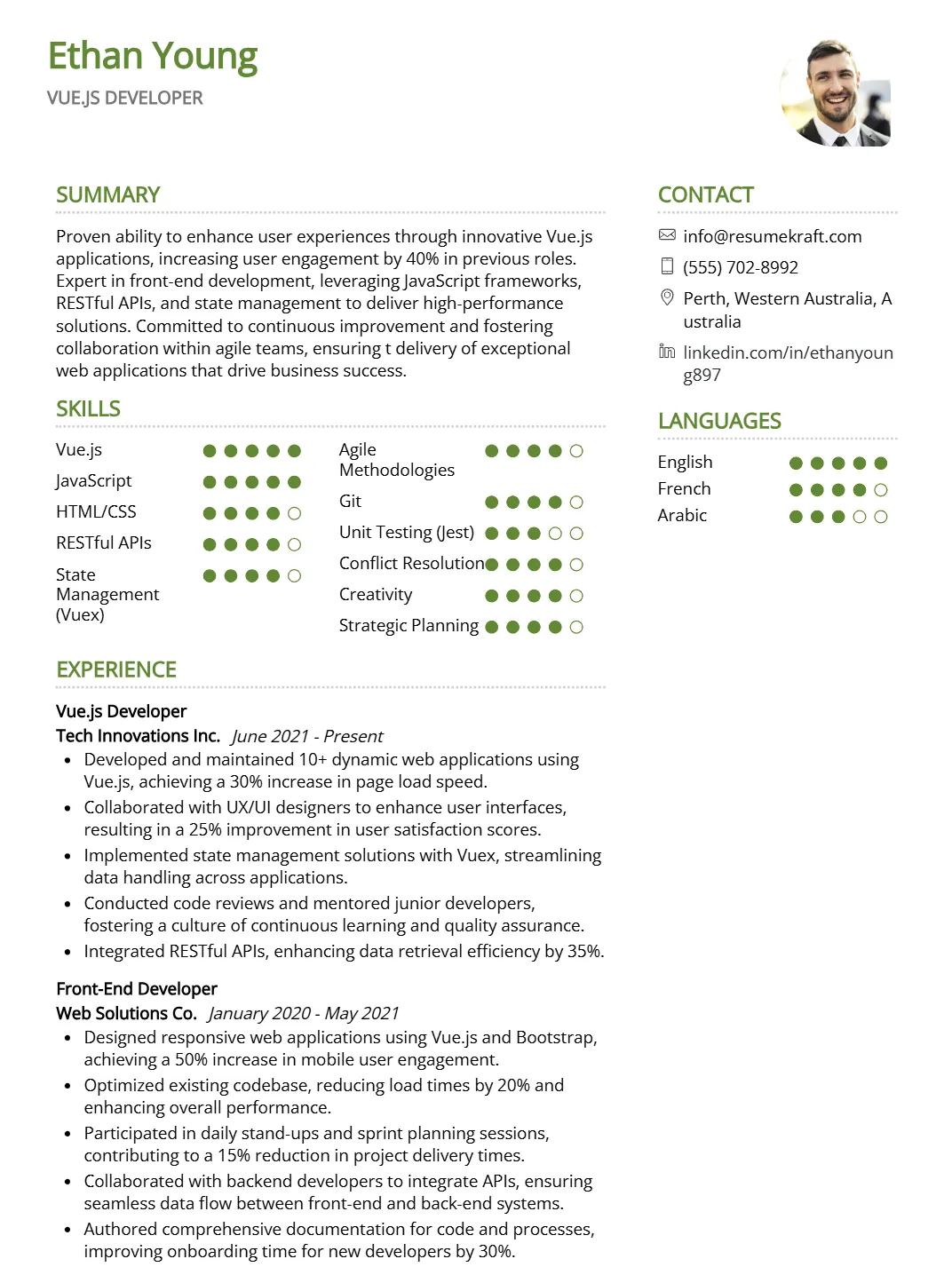
Why This Resume Works
This resume effectively highlights the candidate’s extensive experience as a Vue.js Developer, showcasing vital skills like Vue.js, JavaScript, and state management with Vuex. Its clear format emphasizes relevant achievements, making it easy for hiring managers to assess qualifications. The structured presentation is tailored to front-end development roles, ensuring ATS compatibility by incorporating industry-specific keywords. By focusing on applicable skills and experiences, this resume stands out in a competitive job market for Vue.js positions, aligning closely with employer expectations.
Angular Developer Resume
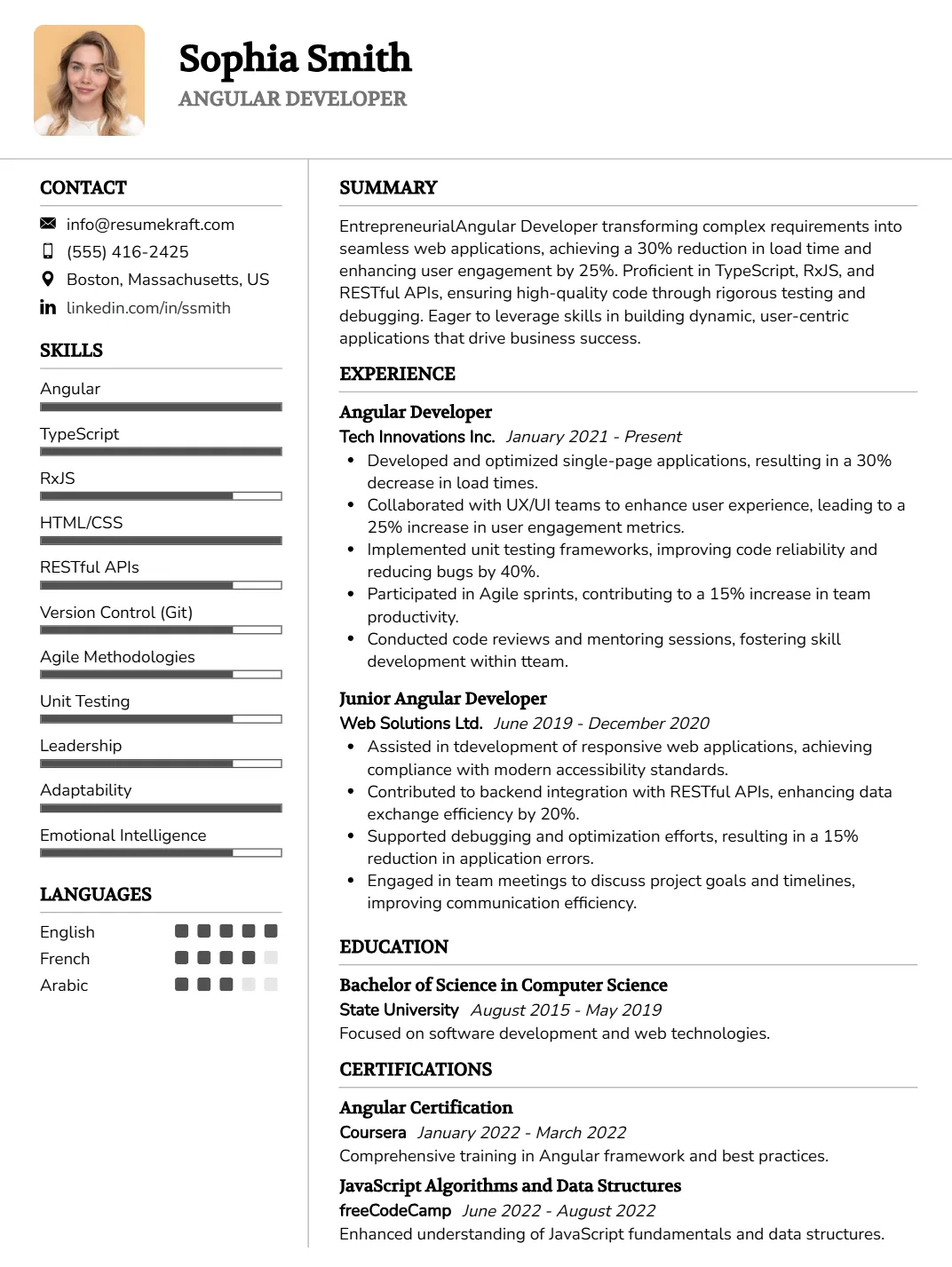
Why This Resume Works
This resume effectively showcases the candidate’s suitability for an Angular Developer position by highlighting essential skills like Angular, TypeScript, and RxJS alongside five years of relevant experience. Its clear structure makes it easy to navigate, emphasizing key competencies that align with industry standards. The format is ATS-friendly, ensuring compatibility with applicant tracking systems commonly used in tech hiring. Additionally, the strategic presentation of achievements demonstrates tangible contributions to previous projects, making a compelling case for the candidate’s potential impact in a new role.
TypeScript Developer Resume
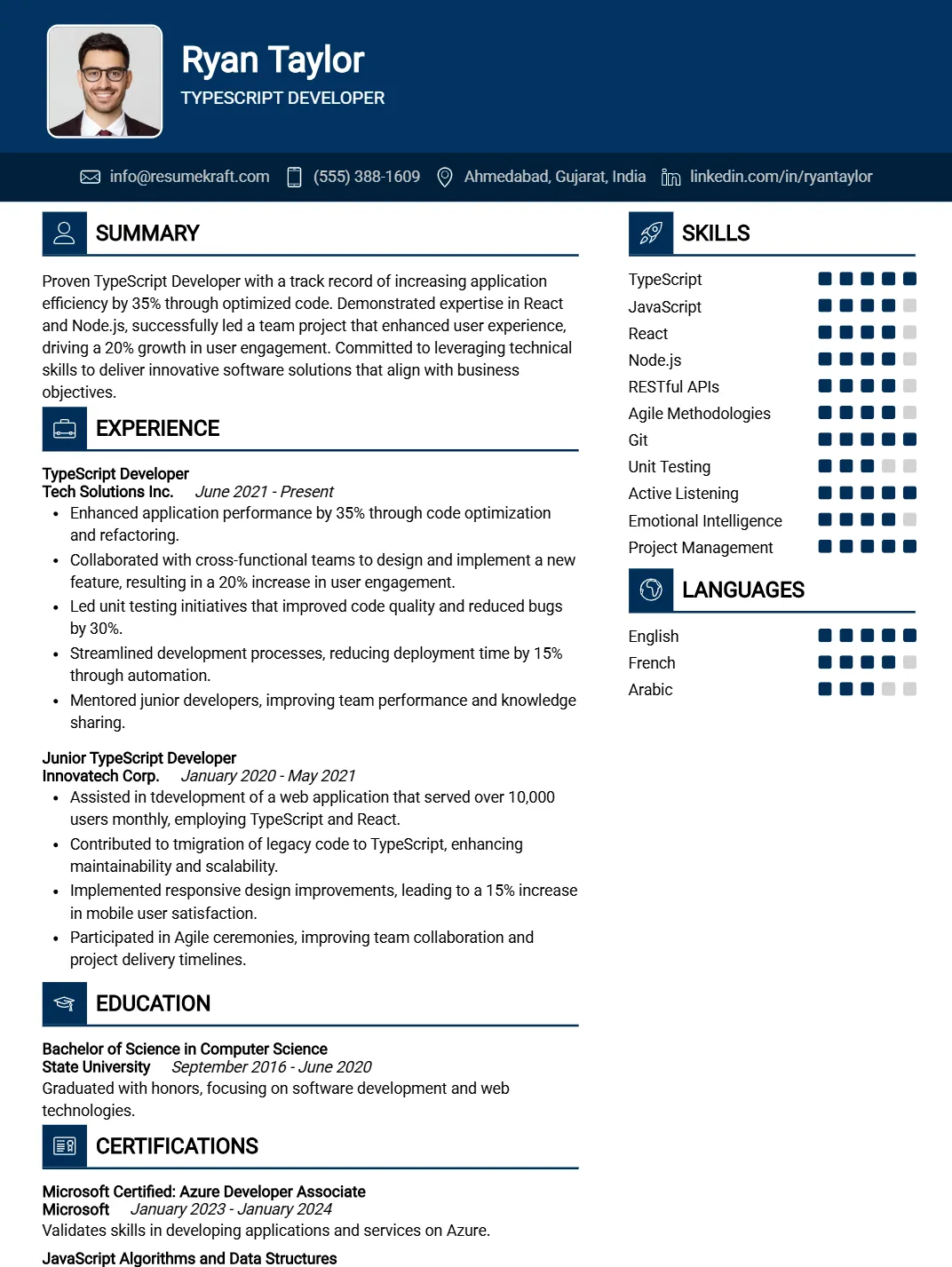
Why This Resume Works
This resume effectively highlights the candidate’s relevant skills, showcasing expertise in TypeScript, JavaScript, React, and Node.js—key technologies for a TypeScript Developer. With five years of experience, including a progression from Junior to TypeScript Developer, it demonstrates growth and proficiency. The clear format enhances readability while ensuring ATS compatibility through the inclusion of industry-specific keywords. Strategic presentation of achievements related to project success and performance metrics further emphasizes the candidate’s capability to deliver results in a competitive field.
Web Developer Resume
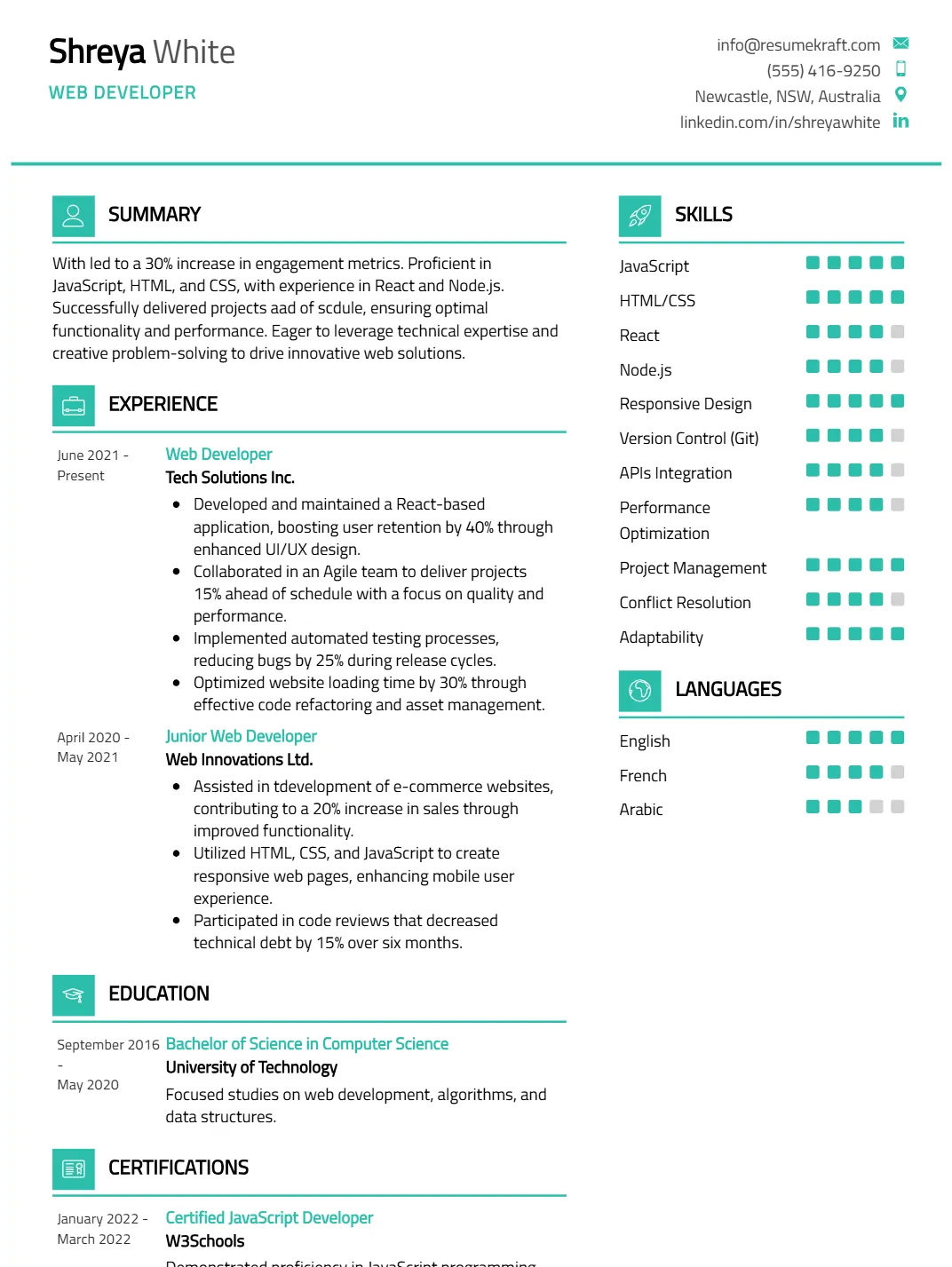
Why This Resume Works
This resume effectively showcases the candidate’s qualifications for a Web Developer position by prominently highlighting essential skills like JavaScript, HTML/CSS, React, and Node.js. With approximately five years of relevant experience, the structured format emphasizes both technical expertise and practical application in web development. Its clear layout enhances readability and ensures ATS compatibility by including industry-specific keywords. Moreover, strategic presentation of achievements demonstrates the candidate’s ability to deliver responsive designs and innovative solutions, making them a strong contender for the role.
UI Developer Resume
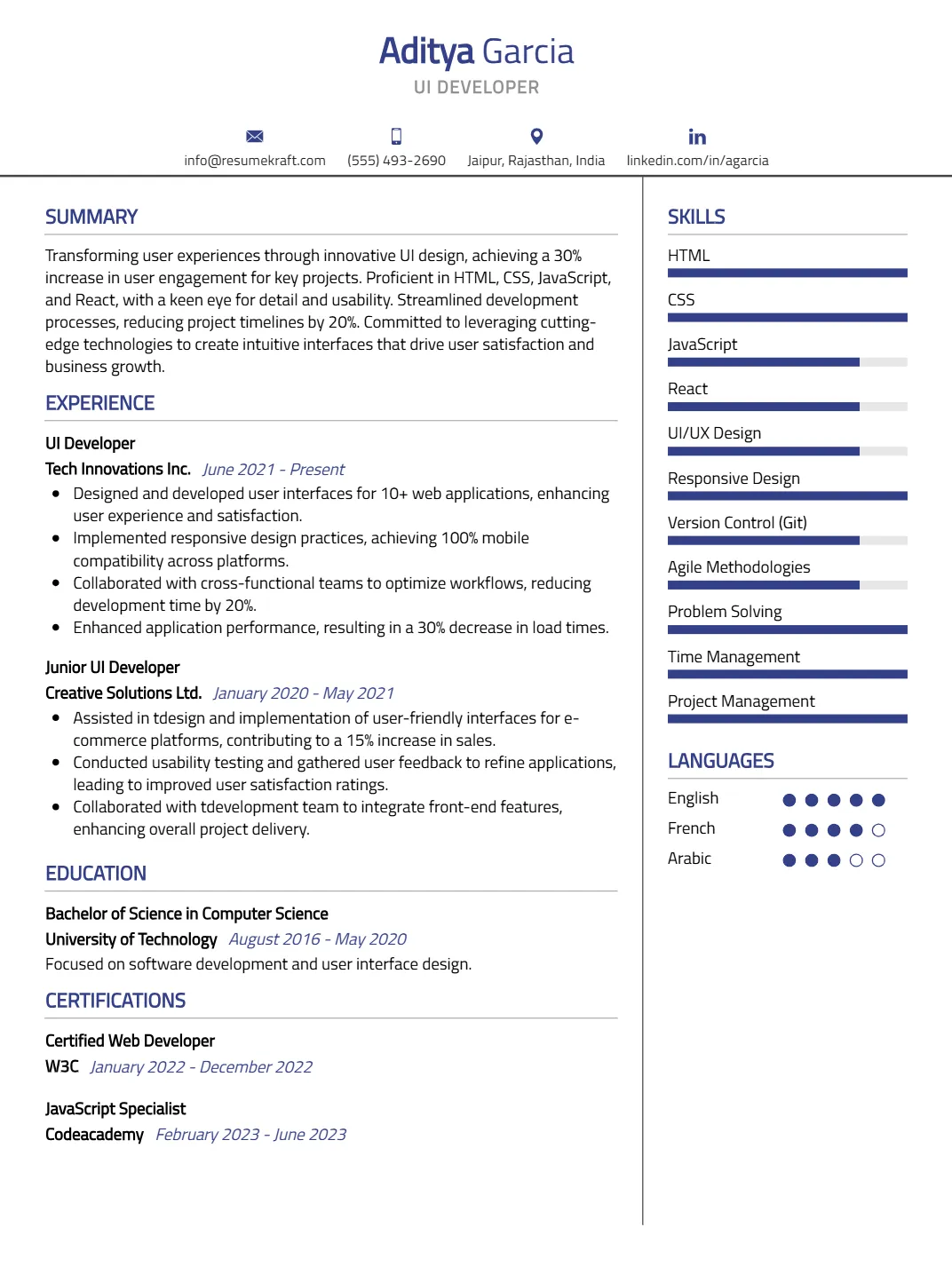
Why This Resume Works
This resume effectively showcases the candidate’s suitability for a UI Developer position by prominently featuring relevant skills like HTML, CSS, JavaScript, and React, essential for modern web development. With approximately five years of experience in both UI Developer and Junior UI Developer roles, it demonstrates a clear career progression. The structured format enhances readability and ensures ATS compatibility by incorporating industry-specific keywords. Additionally, strategic presentation of achievements highlights the candidate’s impact on user experience design, making them stand out in a competitive field.
MERN Stack Developer Resume
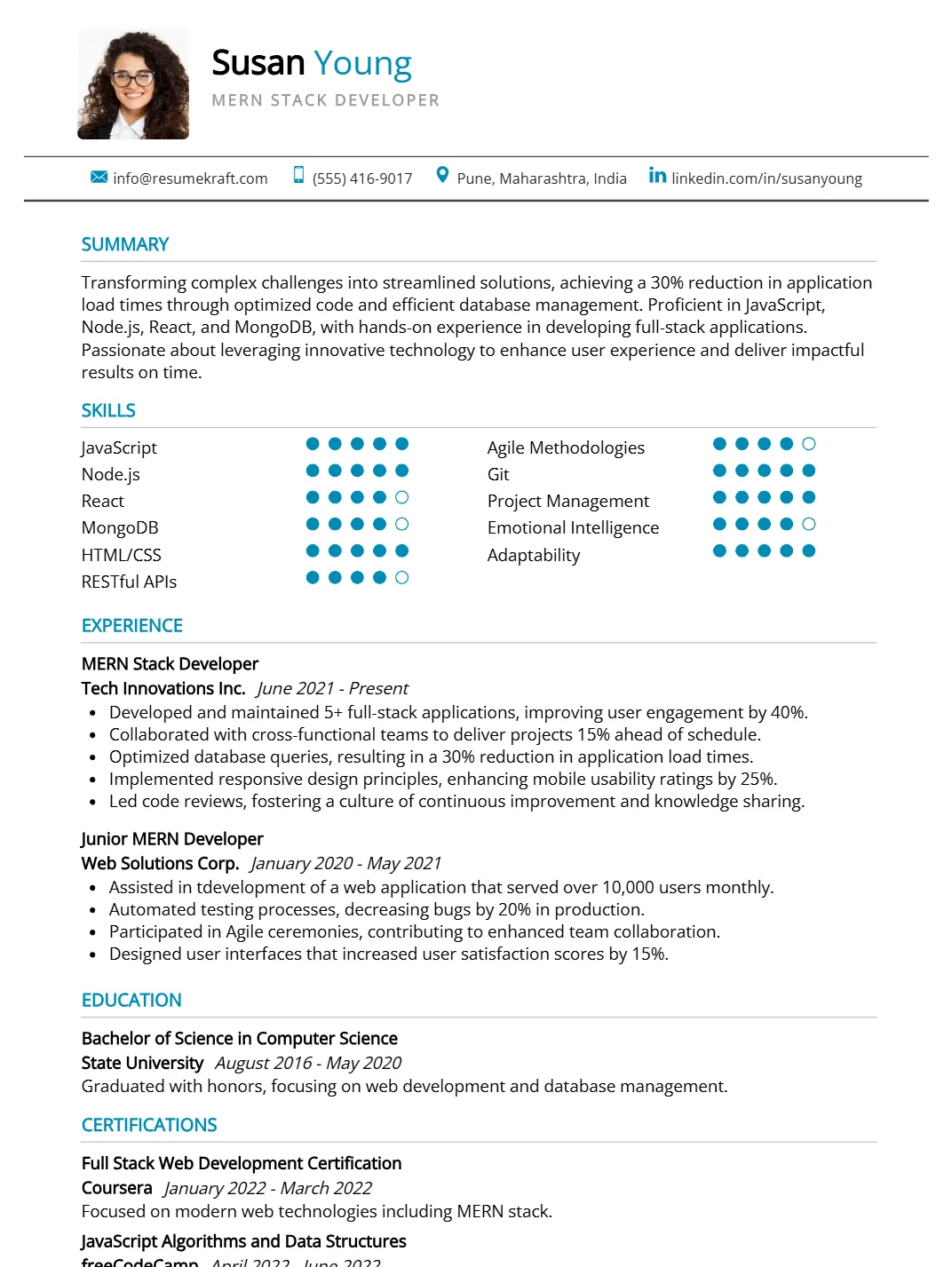
Why This Resume Works
This resume effectively highlights the candidate’s relevant skills and experience for a MERN Stack Developer position, showcasing proficiency in JavaScript, Node.js, React, and MongoDB. With approximately five years of progressive experience, it emphasizes both roles as a MERN developer, enhancing credibility. The structured format allows for easy navigation, vital for quick assessments by hiring managers. Additionally, the use of industry-specific keywords ensures ATS compatibility. Strategic presentation of achievements demonstrates tangible contributions to projects, making this resume particularly compelling in the competitive tech landscape.
How to format a JavaScript Developer resume template
Proper formatting is crucial for a JavaScript Developer resume, as it enhances readability and showcases your technical skills effectively. An organized resume format allows hiring managers to quickly identify your experience and qualifications, increasing your chances of landing an interview.
- Use a clean, professional layout with clear headings and consistent font sizes to enhance readability. Avoid clutter, ensuring that your key skills and experiences stand out prominently.
- Prioritize relevant experience by placing your most recent and impactful projects at the top. This approach allows hiring managers to quickly assess your suitability for the JavaScript Developer role.
- Incorporate bullet points for job descriptions and project details. This format makes it easier to scan through your achievements and responsibilities, highlighting your contributions effectively.
- Include links to your portfolio or GitHub profile in the header. This instantly provides access to your code samples and projects, demonstrating your practical skills in JavaScript development.
- Use whitespace strategically to avoid overwhelming the reader. Adequate spacing between sections helps maintain focus and allows important information to be easily digestible.
How to write your JavaScript Developer resume experience
Effectively presenting work experience on a JavaScript Developer resume is essential, as this section provides employers with insight into your practical skills and past contributions. Recruiters look for specific projects, technologies used, and measurable outcomes to gauge your proficiency and suitability for their teams.
Worked on various JavaScript projects for different clients. Responsible for coding and fixing bugs.
Developed and maintained a single-page application using React, resulting in a 30% increase in user engagement and a 40% decrease in load times.
How to list your hard skills and soft skills on your resume
As a JavaScript Developer, showcasing both hard and soft skills on your resume is essential for standing out in a competitive job market. Hard skills demonstrate your technical proficiency and ability to write efficient code, while soft skills highlight your interpersonal abilities, teamwork, and problem-solving capabilities. A well-rounded resume that emphasizes both types of skills can effectively convey your qualifications to potential employers and illustrate your capacity for collaboration and innovation within development teams.
Hard Skills:
- JavaScript: Proficient in ES6+ syntax and features.
- HTML/CSS: Strong understanding of web technologies for structuring and styling.
- Frameworks: Experience with React, Angular, or Vue.js for building dynamic UIs.
- Node.js: Knowledge of server-side JavaScript for backend development.
- RESTful APIs: Ability to design and integrate APIs for seamless data exchange.
- Version Control: Proficient in Git for source code management and collaboration.
- Testing Frameworks: Familiarity with Jest, Mocha, or Jasmine for unit testing.
- Responsive Design: Skills in creating mobile-friendly and adaptive web applications.
- Debugging: Expertise in using tools like Chrome DevTools to troubleshoot code issues.
- Database Management: Knowledge of NoSQL databases like MongoDB or SQL databases.
- Code Optimization: Ability to write clean, efficient, and maintainable code.
- Performance Tuning: Experience in optimizing load times and application performance.
- Deployment: Familiarity with CI/CD pipelines for automated deployment processes.
- Webpack: Knowledge of module bundling and asset management.
- Agile Methodologies: Experience working in Agile environments for iterative development.
Soft Skills:
- Problem-Solving: Strong analytical skills to address complex coding challenges.
- Communication: Ability to clearly articulate technical concepts to non-technical stakeholders.
- Teamwork: Collaborative spirit that promotes synergy within development teams.
- Adaptability: Flexibility to learn new technologies and adapt to changing project requirements.
- Time Management: Efficiently prioritizing tasks to meet deadlines and project goals.
- Attention to Detail: Careful focus on code quality and user experience.
- Creativity: Innovative thinking to develop unique solutions and features.
- Critical Thinking: Ability to assess situations and make informed decisions.
- Empathy: Understanding user needs to create more effective applications.
- Leadership: Capability to mentor junior developers and lead project initiatives.
- Conflict Resolution: Skills in navigating team disagreements to maintain harmony.
- Self-Motivation: Driven to pursue continuous learning and improvement in coding skills.
- Customer Focus: Commitment to delivering high-quality user experiences.
- Open-mindedness: Willingness to accept feedback and iterate on ideas.
- Networking: Ability to build professional relationships within the tech community.
- Resilience: Capacity to handle setbacks and persist in problem-solving efforts.
How to list your certifications and education on your resume
When presenting certifications and education on a JavaScript Developer resume, it’s crucial to highlight relevant qualifications that demonstrate technical proficiency. Focus on degrees in Computer Science, Software Engineering, or Information Technology, as well as certifications such as JavaScript frameworks (e.g., React, Angular) or full-stack development. Ensure that you list the most recent or relevant qualifications first, as this will capture the employer’s attention.
Additionally, clearly state the institution, degree obtained, and graduation date. For certifications, include the certifying body and the date received. This structured approach not only provides clarity but also showcases your commitment to staying updated with industry standards.
Graduated from college. Took some online courses about JavaScript and web development.
Bachelor of Science in Computer Science, University of XYZ, May 2022. Certified JavaScript Developer, Code Academy, June 2023. Certified in React.js, FreeCodeCamp, February 2023.
How to write your JavaScript Developer resume summary or objective
A strong resume summary or objective is crucial for a JavaScript Developer as it provides a snapshot of your professional identity, skills, and career aspirations. A summary is best suited for individuals with experience, highlighting key achievements and technical proficiencies, while an objective is ideal for entry-level candidates, focusing on career goals and eagerness to contribute to a potential employer.
Looking for a job as a JavaScript Developer. I have some coding skills and am willing to learn more.
Detail-oriented JavaScript Developer with 3 years of experience in building dynamic web applications, proficient in React and Node.js, seeking to leverage expertise in a challenging role at an innovative tech company.
Additional sections for a JavaScript Developer resume
Including additional sections in a JavaScript Developer resume can significantly enhance its impact by showcasing relevant skills, experiences, and projects. These sections can help capture the attention of hiring managers and demonstrate your qualifications effectively.
- **Projects**: Highlighting specific projects showcases your practical experience with JavaScript, providing concrete examples of your problem-solving skills and technical expertise that can resonate with potential employers.
- **Certifications**: Listing relevant certifications, such as those from recognized platforms, demonstrates your commitment to professional development and proficiency in JavaScript frameworks, enhancing your credibility as a developer.
- **Technical Skills**: A dedicated section for technical skills allows you to succinctly list your JavaScript-related competencies, frameworks, and tools, making it easy for hiring managers to quickly assess your qualifications.
- **Contributions to Open Source**: Including contributions to open-source projects illustrates your collaborative spirit and real-world coding experience, showcasing your ability to work within teams and contribute to larger community efforts.
- **Professional Summary**: A brief professional summary can provide an overview of your career journey, technical abilities, and passion for development, setting the tone for your resume and making a strong first impression.
Key takeaways for writing a professional JavaScript Developer resume
- Highlight your proficiency in JavaScript frameworks like React or Angular, showcasing specific projects where you utilized these technologies to enhance user experience and functionality.
- Use action verbs and quantifiable achievements to demonstrate your impact, such as “increased site performance by 30% through optimized JavaScript coding.”
- Utilize resume templates that align with tech industry standards to create a clean, professional layout that draws attention to your skills and experiences.
- Incorporate keywords from job descriptions to pass through applicant tracking systems, ensuring your resume gets noticed by hiring managers.
- Consider using an ai resume builder to streamline the resume creation process, helping to craft a tailored document that highlights your unique qualifications effectively.
Frequently Asked Questions
How long should my JavaScript Developer resume be?
Your JavaScript Developer resume should ideally be one page, especially if you have less than 10 years of experience. This concise format allows you to highlight your most relevant skills and accomplishments without overwhelming potential employers. If you have extensive experience or numerous projects, you may extend it to two pages, but ensure that every detail contributes to your candidacy. Focus on quality over quantity, emphasizing impactful achievements that demonstrate your expertise in JavaScript development.
What is the best format for a JavaScript Developer resume?
The best format for a JavaScript Developer resume is a reverse-chronological layout. This format presents your most recent work experience at the top, making it easy for recruiters to see your latest roles and achievements. Use clear headings for sections such as Summary, Skills, Experience, and Education. Incorporating bullet points for responsibilities and accomplishments enhances readability. Additionally, consider a clean and modern design that reflects your coding skills and attention to detail, while avoiding overly complex layouts.
What should I highlight on my JavaScript Developer resume to stand out?
To stand out as a JavaScript Developer, highlight your proficiency in both core JavaScript and modern frameworks like React, Angular, or Vue.js. Showcase specific projects where you utilized these technologies, emphasizing your role and contributions. Include any experience with version control systems like Git, as well as your understanding of front-end performance optimization and responsive design. Additionally, mentioning your collaboration with cross-functional teams and any relevant certifications can further enhance your appeal to potential employers.
What are some ways to quantify my experience on my JavaScript Developer resume?
Quantifying your experience on your JavaScript Developer resume can significantly enhance its impact. Use metrics to illustrate your achievements, such as the number of projects completed, lines of code written, or the percentage of performance improvements achieved through your optimizations. For example, instead of saying “improved application speed,” specify “increased application speed by 30% through code optimization.” Additionally, state the size of teams you’ve collaborated with or the number of users impacted by your projects to provide concrete evidence of your contributions.









